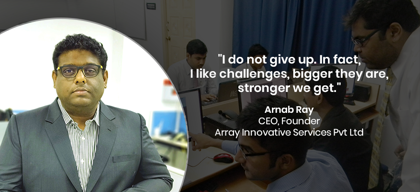
- What's in it for you?
- 4 simple steps to start networking
- Standard Chartered Business Banking solutions for a visionary
- Updates to empower you
- Upcoming Events
- Entrepreneur Testimonials
- What's in it for you?
- Standard Chartered Business Banking solutions for a boss woman
- Add to cart. Give your business the online edge
- Women in Ecommerce - Success Stories
- Women SME Inspirations
- Women Business Owners Groups
- Upcoming Events
- What's in it for you?
- Standard Chartered Business Banking solutions for an expanding business
- Set up you ecommerce website with ease
- Start your own export ecommerce website with Linker.store
- Too busy to do it yourself? Hire an expert
- Meet the like-minded
- Sell on Indian Business Portal
- Upcoming Events
- Entrepreneur Testimonials
No such thing as bad leadership

Leadership & Management
286 week ago — 8 min read
Summary: Is leadership all about having power? What makes for a truly great leader? In this enlightening article, Rajeev Peshawaria gets into the heart of what 'leadership' should really entail. Read on and share your thoughts in the comments section below.
If you are leading a group discussion on the subject of leadership and want people to start participating actively right from the word go, open the session by making the following statement: There is no such thing as bad leadership.
Almost immediately, several people will challenge you, and offer many examples of bad leadership. Someone will invariably bring up examples like Hitler, Stalin, Robert Mugabe and Saddam Hussein. If you nudge the group a bit, they will also start talking about all the bad leaders they have encountered in their corporate careers. In fact, be prepared, because the discussion can easily get very heated and emotional. A participant in one of my seminars got really agitated in the first 20 minutes of the programme, and angrily told me how I had no idea what it was like to work for all those bad leaders he has had to suffer in his career.
I don’t disagree that most of the examples given are of people that stood for bad and immoral ideas, or treated others without the respect and dignity that every human deserves. I also don’t underestimate the damage such people cause to society. The only question I have is, were these people leaders in the first place? Or were they simply people who somehow found themselves in positions of power through brute force, cunning, chance, or all three?
Despite the thousands of books written on the subject, and despite billions spent each year on teaching it, leadership is a very misunderstood word. Most of us regard people in positions of power and authority as leaders. And here is where the problem begins. If leadership is about obtaining a position of power and hanging on to it, then Hosni Mubarak, Kim Jong il and Fidel Castro ought to be considered amongst some of the most successful leaders in the world.
Between them, they clocked almost 140 years of remaining in power. Who cares if they did something good or not? Ultimately these so called leaders take their followers, their companies and their countries into futures worse than their past and present. You might argue that this is the reason why they are called bad leaders, but I respectfully disagree. Leadership is not about occupying a position or about having power and authority at all.
Nelson Mandela was regarded a great leader long before he became president. How could he be a leader during the long years in prison? Clearly, he had no position or power while in prison, yet ultimately he overturned apartheid. Mahatma Gandhi never occupied any political office and never had any material wealth or power of any kind, yet he succeeded in sending the British back home without firing a bullet. Gandhi’s impact was so profound that among millions of others, none other than Albert Einstein called him one of the greatest leaders to have ever walked upon this earth. Countless mothers around the world work tirelessly every day and every night to groom their children with the hope that they (the children) will one day become responsible citizens. Many unsung middle managers in companies around the world coach their subordinates selflessly so that they (the subordinates) can be as successful as can be. Many such mentor-managers are relatively powerless in their organisations, and often have very bad bosses above them. Instead of passing down the same bad behaviour they receive from their bosses, these managers choose to behave differently with their subordinates. They make this choice knowing very well that their efforts will not be recognised by the higher ups, but they do it anyway because they have a deep desire to ensure that tomorrow is better than today. They are the real leaders.
So if leadership is not about position power, then what is it? Leadership is about first visualising, then working endlessly towards creating a better future. The key is in the word better. The better future leaders strive to create is not for themselves alone, it is for others around them as well. If all you work towards is getting a better deal for yourself alone, you are not a leader. If your goal is to simply win an election or to get promoted to the next level, you are not a leader. To be a leader, you need to have a clear picture of the better future you want to create, and an even clearer picture of what is ethically right and wrong. I often refer to these two things as purpose and values.
The problem is, some people have a very self-focused purpose, and they are able to work very hard to achieve it. They do not however have an equally clear sense of values. They go after their goal no matter what the price. Furthermore, as they taste initial success, they get hungry for more and more. Without a moral compass, they become what many people call bad leaders. The point I am making is simply this – people with just a self-focused purpose are not leaders at all. They may occupy important and powerful positions but they are not leaders. They are demagogues, dictators, thugs, dons, or bullies. At best they are heedless. And even if their purpose is not self-focused, they still don’t become leaders until they are able to clearly articulate and act upon their moral values. A narrow purpose, and/or the absence of values can make you a boss, but not a leader. A broader purpose (one that goes beyond self interest alone) together with enduring moral values makes a leader. In this sense, there is no such thing as a bad leader. There are leaders, and there are good or bad bosses.
In 2008 when Hank Paulson and Ben Bernanke decided to let Lehman Brothers fail, did they consider the global ramifications of their action? In recent months as Democrats and Republicans openly squabbled about the budget deficit, what was their purpose? What values were they exhibiting? And did they realise the impact of their actions in today’s flat and interconnected world? Moving east, in India today, powerful politicians are trying their best to block a strong anti corruption bill from being enacted. They argue that the Prime Minister, all cabinet ministers and members of parliament should not be under the purview of the bill. In other words, they want to pass an anti corruption bill for the country, but want to exempt themselves from it. You may say these are perfect examples of bad leadership. I say this is not leadership at all. Only when they demonstrate both higher purpose and enduring values should we call someone a leader. Almost everywhere in the world today we can see a complete breakdown of ethics. This is because we don’t have leaders, we only have bosses.
So let us reserve the ‘leader’ title for only those who deserve it. Leadership is a choice, not a position or a promotion. Leadership is a way of life, like faith and religion. You practice it if you believe in it, and you act according to those beliefs. If more people around the world start practicing the religion of leaderism as described in this essay, the world will become a much better and safer place.
Article source: https://iclif.org/articles/no-such-thing-as-bad-leadership/
To explore business opportunities, link with me by clicking on the 'Invite' button on my eBiz Card.
Disclaimer: The views and opinions expressed in this article are those of the author and do not necessarily reflect the views, official policy or position of GlobalLinker.
View Rajeev 's profile
SME Inspirations
Other articles written by Rajeev Peshawaria
Let the cream naturally rise to the top
247 week ago
The other duty of corporate governance
253 week ago
Most read this week
















Comments
Please login or Register to join the discussion